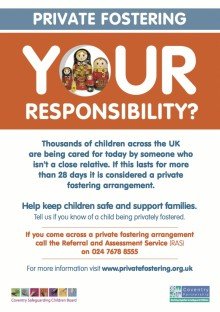Are you looking after Somebody Else’s Child? That’s the question that’s being posed to residents as part of a week-long campaign (starting Mon 6 July) to raise awareness of private fostering and its legal responsibilities.
The ‘Somebody Else’s Child’ campaign organised by Bournemouth Council and the Borough of Poole coincides with the National Private Fostering Week (6 – 12 July 2015) and aims to target adults who are private foster carers to highlight the legal requirement to notify the Council if they are looking after somebody else’s child.
Private fostering is when a child under the age of 16 (under 18 if disabled) is cared for by someone who is not their parent or a close relative. This is a private arrangement made between a parent and a carer for 28 days or more. Close relatives are defined as step-parents, grandparents, brothers, sisters, uncles or aunts (whether full blood or half blood or marriage).
Examples of private fostering include children sent by their parents from abroad to stay with another family via language schools or agents, usually to improve their English or for educational opportunities; asylum seeking and refugee children; teenagers who, having broken ties with their parents, are staying in short term arrangements with friends or other non-relatives; and children living with members of their extended family.
Councillor Nicola Greene, Bournemouth Council’s Cabinet member for Children’s Services, said: “By law the Council must be informed about any private fostering arrangements to ensure safeguards are in place for the child and advice and support can be provided. However, people may not always be aware that they are providing private foster care and so I would urge families, parents and private foster carers to notify the local council so that essential welfare checks for the children and support services can be provided.”
Councillor Mike White, Cabinet Portfolio Holder for Children, Young People and Capital Projects, Borough of Poole, said: “Private fostering arrangements may sometimes be made informally within families, but it is important that we are made aware so that we can ensure that the child’s welfare is made the top priority. The carers themselves can also benefit, with a wealth of information and support available from the Council.”
Council support for private foster carers and children include:
· Arranging for a social worker to visit the private foster carers and the child
· Assisting carers to fill in the necessary forms to apply to be a private foster carer
· Helping to ensure that the child’s cultural, linguistic and religious needs are being met
· Offering advice and support to the child, their parent(s) and private foster carers
· Advice on claiming benefits
· Help in bringing families in crisis back together.
For more information about private fostering or to report a private foster caring arrangement please contact the Council’s Private Fostering team.
Bournemouth: Tel 01202 458101
Poole: Tel: 01202 714711
www.bournemouth.gov.uk/privatefostering
www.poole.gov.uk/health-and-social-care/fostering/private-fostering/







